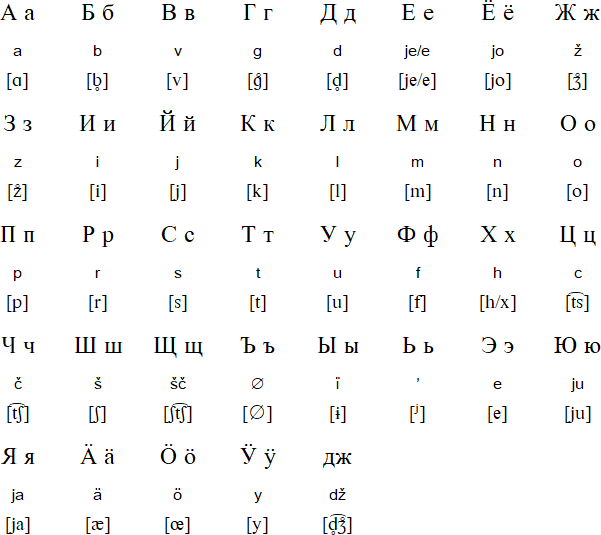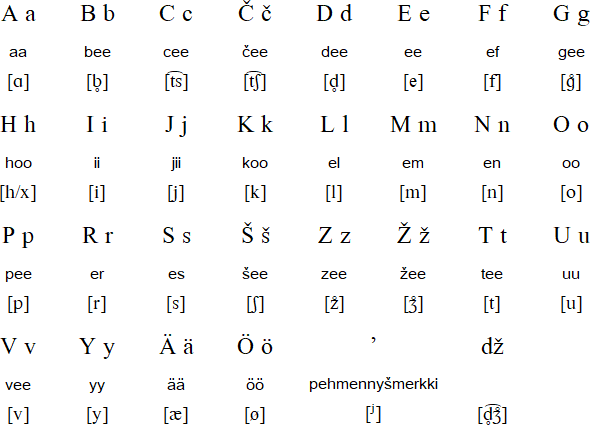Ludic is a Finnic language spoken in the Republic of Karelia in Russia, near the northeastern shore of Lake Onega (Онежское озеро). In 2012 there are about 3,000 speakers of Ludic, which is also known as Ludian, Ludic Karelian, Lyudic, Lyudikovian or Lüüdi.
Ludic is classified by Finnish linguists as a transitional dialect between the Livvi-Karelien language, which is also known as Olonets Karelian, and Veps. Russian linguists classify Ludic as a dialect of Karelian. Recently proposals have been made to recognise it as a separate language.
Ludic was first written with the Cyrillic alphabet. A version of the Latin alphabet was used from the 1930s, and a new Latin alphabet for Ludic was introduced by the government of the Republic of Karelia in 2007. This was amended in 2014.
The earliest known piece of written Ludic appeared in a 17th century Latin manuscript. During the 19th century some poems, stories and songs in Ludic were collected. The first Ludic dictionary was published in 1908 in St Petersburg. A monthly newspaper in Ludic has been published since 2008. A number of novels and other books have also been published in Ludic.
The Ludian Society (Lüüdilaine Siebr) was founded in 1998 in Finland to support the Ludian language, to arrange culture exchange between Finland and Ludian-speaking parts of Karelia (Lüüdiland), and to produce Ludian publications.

Ф, ц, щ, ъ and ы were only used in names and loanwords.

C, f, q (kuu), w (kakšisvee) and x (iks) are only used in names and loanwords.
Download alphabet charts for Ludic (Excel)
Лÿÿдин киелел пагизийад элетäх Кардьалан тазавалдан Ануксен, Приäжан да Кондупохйан пиириис. Кохтад, куз хÿö элетäх, олдах: Пÿхарви, Приäжа, Кендäрви, Лахте, Тивдии, Куйäрви ими. Нÿгÿ лÿÿдин киели он хäвимäс. Он дьугед сануда, äийÿго лÿÿдилаижед он олемас. Кеилентуткийад дуумаийах, гу нет олдах лäс виитт садад. Он хÿвä, ку лÿÿдин киель сежо он отетту меиден корпусах
Lyydin kielel pagizijad eletäh Kardʼalan tazavaldan Anuksen, Priäžan da Kondupohjan piiriis. Kohtad, kuz hyö eletäh, oldah: Pyharvi, Priäža, Kendärvi, Lahte, Tivdii, Kujärvi imi. Nygy lyydin kieli on hävimäs. On dʼuged sanuda, äijygo lyydilaižed on olemas. Keilentutkijad duumaijah, gu net oldah läs viitt sadad. On hyvä, ku lyydin kielʼ sežo on otettu meiden korpusah.
Karelian-Ludic people live in a number of villages in the southeastern part of the Republic of Karelia, that is in the Olonets, Pryazha and Kondopoga districts. Svyatoozero, Yarn, Konchezero, Spasskaya Guba, Tivdiya, Mikhailovskoye are the most famous settlements where the inhabitants speak in Ludic language. Ludic dialect is on the verge of total extinction, since about 4,000-5,000 Karelian-Ludic people remain, but only about 300-500 of them are native speakers. It is extremely important that the Ludic dialect will be presented in the Open corpus of Veps and Karelian languages.
Source: YouTube (see below)
Details provided by Michael Peter Füstumum
Information about Ludic | Numbers
Information about the Ludic language and people
https://en.wikipedia.org/wiki/Ludic_language
https://fi.wikipedia.org/wiki/Lyydin_kieli
https://ru.wikipedia.org/wiki/Людиковское_наречие
https://www.ethnologue.com/language/lud
Ludian Society / Lüüdilaine Siebr
http://lyydi.net/
Estonian, Finnish, Karelian, Kven, Livvi-Karelian, Livonian, Ludic, Meänkieli, Seto, Veps, Võro, Votic
Abaza, Abkhaz, Adyghe, Aghul, Akhvakh, Akkala Sámi, Aleut, Altay, Alyutor, Andi, Archi, Assyrian / Neo-Assyrian, Avar, Azeri, Bagvalal, Balkar, Bashkir, Belarusian, Bezhta, Bosnian, Botlikh, Budukh, Bulgarian, Buryat, Chamalal, Chechen, Chelkan, Chukchi, Chulym, Chuvash, Crimean Tatar, Dargwa, Daur, Dolgan, Dungan, Enets, Erzya, Even, Evenki, Gagauz, Godoberi, Hinukh, Hunzib, Ingush, Interslavic, Itelmen, Juhuri, Kabardian, Kaitag, Kalderash Romani, Kalmyk, Karaim, Karakalpak, Karata, Karelian, Kazakh, Ket, Khakas, Khanty, Khinalug, Khorasani Turkic, Khwarshi, Kildin Sámi, Kili, Komi, Koryak, Krymchak, Kryts, Kubachi, Kumandy, Kumyk, Kurdish, Kyrgyz, Lak, Lezgi, Lingua Franca Nova, Lithuanian, Ludic, Macedonian, Mansi, Mari, Moksha, Moldovan, Mongolian, Montenegrin, Nanai, Negidal, Nenets, Nganasan, Nivkh, Nogai, Old Church Slavonic, Oroch, Orok, Ossetian, Pontic Greek, Romanian, Rushani, Russian, Rusyn, Rutul, Selkup, Serbian, Shor, Shughni, Siberian Tatar, Sirenik, Slovio, Soyot, Tabassaran, Tajik, Talysh, Tat, Tatar, Teleut, Ter Sámi, Tindi, Tofa, Tsakhur, Tsez, Turkmen, Tuvan, Ubykh, Udege, Udi, Udmurt, Ukrainian, Ulch, Urum, Uyghur, Uzbek, Veps, Votic, Wakhi, West Polesian, Xibe, Yaghnobi, Yakut, Yazghulami, Yukaghir (Northern / Tundra), Yukaghir (Southern / Kolyma), Yupik (Central Siberian)
Languages written with the Latin alphabet
Page last modified: 01.06.25
[top]
You can support this site by Buying Me A Coffee, and if you like what you see on this page, you can use the buttons below to share it with people you know.

If you like this site and find it useful, you can support it by making a donation via PayPal or Patreon, or by contributing in other ways. Omniglot is how I make my living.
Note: all links on this site to Amazon.com, Amazon.co.uk
and Amazon.fr
are affiliate links. This means I earn a commission if you click on any of them and buy something. So by clicking on these links you can help to support this site.
[top]